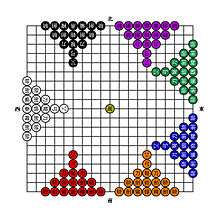Game of the Seven Kingdoms
 Starting position | |
| Designer(s) | Sima Guang |
|---|---|
| Years active | Since 13th century |
| Genre(s) |
Abstract strategy game Chess variant |
| Players | 7 |
| Skill(s) required | Strategy, tactics |
| Synonym(s) |
Seven-handed xiangqi Qiquo xiangqi |
Game of the Seven Kingdoms (Chinese: 七國象棋, p qī-guó-xiàng-qí ;) is a seven-player variant of the game xiangqi ("Chinese chess"). It was invented by Sima Guang. There is skepticism regarding the game's 13th-century formulation.[1]
See also

Game of the Seven Kingdoms symbolizes the Seven Warring States period (403–221 BC).[2]
References
- ↑ "The imbalance in the array must reflect on the play (assuming that the game was ever played), and can perhaps be attributed to the fact that a weiqi board rather than a bespoke board was used. The existence of pieces moving as Q and B at least two centuries before their introduction into orthochess is a phenomenon few will credit. (Leventhal, Chess of China)" (Pritchard 2007:343)
- ↑ Pritchard (1994), p. 265
Bibliography
- Leary, Stephen (2001-09-29) [Created 1996-01-01]. "Qiquo Xiangqi: Chinese Chess with seven players". The Chess Variant Pages.
- Pritchard, D. B. (1994). "Seven-Handed Xiangqi". The Encyclopedia of Chess Variants. Games & Puzzles Publications. ISBN 0-9524142-0-1.
- Pritchard, D. B. (2007). "Seven-Handed Xiangqi". In Beasley, John. The Classified Encyclopedia of Chess Variants. John Beasley. pp. 342–43. ISBN 978-0-9555168-0-1.
This article is issued from Wikipedia - version of the 11/28/2015. The text is available under the Creative Commons Attribution/Share Alike but additional terms may apply for the media files.